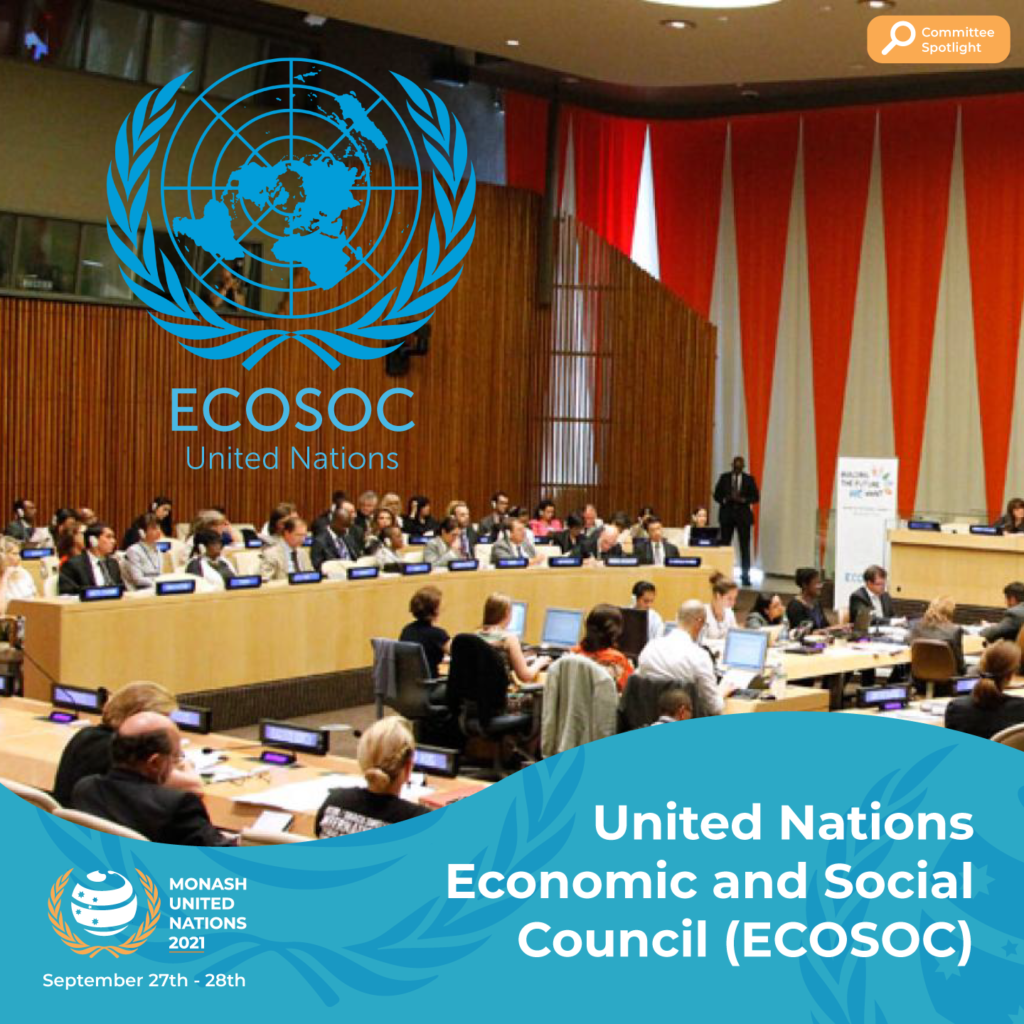DIRECTORS:
Harrini Ratnanesan & Tom Yakubowski

Dear Delegates,
Welcome: ECOSOC 2021
Together, we would like to welcome you to the Economic and Social Council of the Monash United Nations 2021. We look forward to fruitful debate on strong outcomes for the international community.
Globalisation, often hailed as the beating heart of the 21st century’s prosperity and progress, has proven to become a double edged sword in the wake of the COVID-19 pandemic.
The global interconnections we have created have not only served as a tool for fast dissemination of the virus, but also the economic and social consequences SARS-CoV-2 brings with it.
However, not all states have experienced the COVID-19 pandemic and its consequences equally. In fact, the pandemic has exacerbated inequality, both between states and within them.
As a global community, we have a responsibility to mitigate this inequality, and build a more sustainable future for all member states. This action will protect the most vulnerable from crises in the future, too, including climate change and economic shocks.
The time for action is now. We look forward to your contributions to tackle this herculean challenge.
Yours sincerely,
Harrini Ratnanesan and Tom Yakubowski
Co-Directors | ECOSOC 2021
Topic Overview
Sustainable Development of Low and Middle Income States in the Post COVID Era
In late 2019, the SARS-CoV-2 virus emerged in Wuhan, China, and spread rapidly around the globe. This placed immense pressure on health infrastructure to implement social distancing measures, creating adverse social and economic implications worldwide.
However, the impacts of the pandemic have been felt most acutely in low and middle income countries. According to the Centre for Global Development, the majority of COVID-19 cases have been detected in high income countries – not because the Global South has been spared from the pandemic. Rather, low and middle income countries simply have not had the health infrastructure to test, trace and isolate cases.
This data blind spot also exists around recorded deaths. In South Africa, for example, it is feared the COVID-19 death toll is three times higher. This story is repeated across low and middle income states worldwide.
Not only have the health impacts of the pandemic been underreported in low and middle income states, the full range of social and economic consequences are also under-communicated.
The social and economic challenges created by the pandemic are complex and intertwined, and exist in a feedback loop, as demonstrated by the
accompanying flow chart. These include increases in poverty, job instability, loss of education and human capital, as well as deteriorating infrastructure and state capacity to deliver services.
These challenges date back to the pre-pandemic era. The framework to tackle these challenges, the Sustainable Development Goals (SDGs), were also slow to implement, with 18% of fragile states on track to implement the goals by 2030.
The pandemic has amplified this challenge to sustainable development, and has sparked calls for an economic and social recovery focused on ‘building back better’.
While there are many iterations of this, the main focus is for investment and behaviour change in low and middle income states, with the aim of building resilience and safeguarding society against future shocks. Key elements of this include addressing climate change, investing in social services and acting on issues of gender inequality.
Action is needed urgently to combat the challenges created by the pandemic, and factor these into sustainable development for future.
Questions for Consideration
- How can the international community build resilience to public health and economic crises in low and middle income member states?
- What measures can be implemented to strengthen governance, security and peace in low and middle income states?
- How can the implementation of the SDGs be fast-tracked post-COVID?
- What elements of SDG implementation are working? Which are not?
- What solutions to promote the SDGs and sustainable development already exist on the ground?
- How can high income states best assist sustainable development of low and middle income states?
Advice on Unpacking the Topic
- Given the topic is broad and contentious, delegates can exercise their creative and problem solving skills.
- A COVID recovery plan should not be focused on a return to status quo but rather be treated as a long term investment and project to create a more sustainable future. It should be a project that can withstand similar or greater disasters that might occur in the years to come.
- Please remember that the UN doesn’t have a money tree – if you’re going to incorporate funding into your solution, please do some research and provide specifics on where this money is coming from.
- Avoid the creation of arbitrary task forces/special committees/summits to address the problem – while these are useful and definitely a tool that can be used, they shouldn’t be an avenue to effectively palm the ball off to.
- Make sure you thoroughly research the foreign policy of the delegation you are representing but also remember that MUN isn’t just about ‘role play’ – the point is not just to stick to foreign policy as close as possible but to be dynamic with your diplomacy and thinking, to find solutions to current global challenges within the parameters of your country’s nature and disposition.
- Investigate what is already taking place on the ground – sometimes there are existing solutions that can be expanded on.
- Although COVID 19 is new, disaster relief, pandemic/disease management, and post-conflict restructuring is not – previous action taken to help countries emerge from disasters/conflicts/disease outbreaks can help inform your plan on how to construct a sustainable post COVID era.
Key Resources
Title: Building back better: A sustainable, resilient recovery after COVID-19
Organisation: Organisation for Economic Cooperation and Development (OECD).
Overview: This policy document outlines potential steps governments can take to build more sustainable, resilient societies post-COVID.
Title: COVID-19 in Fragile Contexts
Organisation: Mercy Corps
Overview: Examines the impacts of COVID-19, both social, health and economic, in fragile states and conflict zones.
Title: ECOSOC Special Session Urges Building Vulnerable States’ Resilience
Organisation: International Institute for Sustainable Development
Overview: Examines recent developments within ECOSOC in relation to building future resilience in vulnerable states
Title: 2005 ECOSOC Substantive Session on Post Disaster Relief
Organisation: Relief Web
Overview: A summary of the session highlights, including discussion on how to tackle post-disaster relief for small-middle income states
Title: The Economic Impact of COVID-19 in Low- and Middle-Income Countries
Organisation: Centre for Global Development
Overview: An article analysing the potential economic impacts of COVID-19 on low and middle income states
Title: ECOSOC’s response to COVID-19
Organisation: Economic and Social Council
Overview: An 8 page briefing document summarising the actions undertaken by ECOSOC to respond to COVID-19
Title: ECOSOC Ministerial Declaration on COVID-19 Solidarity
Organisation: United Nations
Overview: An article discussing the member-states commitments to overcoming the pandemic and building back through green, inclusive plans
Title: China’s statement at the ECOSOC Operational Activities for Development Segment
Organisation: PRC Permanent Mission to UN
Overview: Transcript of statement given by China’s representative at this meeting, discussing it’s analysis of the problem and potential solutions
Title: Adjusted Drafts for ECOSOC HLPF Review
Organisation: SDG Knowledge Hub
Overview: Article discussing draft resolutions considered by UN member states in ECOSOC pertaining to post COVID recovery
Title: UNCTAD chief: How to rebuild global economy and trade after COVID-19
Organisation: United Nations Conference on Trade and Development
Overview: A detailed interview with the Secretary General of the UNCTD about the future of trade and the global economy post-COVID-19
Title: Socioeconomic impacts of COVID-19 in low-income countries
Organisation: Nature Journal
Overview: Outlines in-depth the socioeconomic impacts of the COVid-19 pandemic in low-income states, with a particular focus on Ethiopia, Nigeria, Malawi and Uganda
